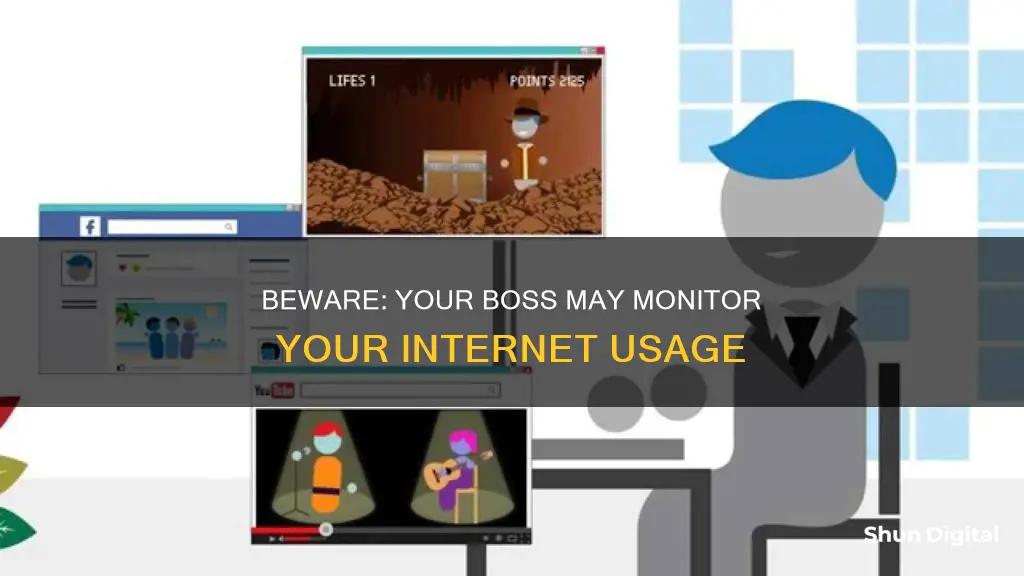
It is a well-known fact that employers monitor their employees' internet usage. This is done to ensure that employees are not wasting company time and money on non-work-related tasks online. While this may seem like an invasion of privacy, it is important to note that employers have a right to protect their business, which is considered their property.
There are several ways in which employers can monitor internet usage. This includes internet surveillance, where a network analyser or packet sniffer is used to view and capture all information passing over network connections. This allows employers to monitor website visits, specific page views, emails sent and received, downloads, and streaming audio and video events. Another method is desktop surveillance, which involves the physical monitoring of an employee's computer and every action taken by the user. This can be done remotely or directly and allows employers to read emails, check programs or files, and monitor the computer's offline usage.
Additionally, employers can also check their employees' IP addresses to ensure they are logging in from secure, work-approved devices. They may also use proxy servers and firewalls to monitor and filter internet traffic, blocking access to certain websites deemed inappropriate or non-work-related.
It is worth noting that there are legal considerations when it comes to employee monitoring. While it is legal in the United States, some states require signage or a monitoring policy to make employees aware of these practices. In the European Union, regulations such as the General Data Protection Regulation (GDPR) must also be complied with to avoid legal liabilities and penalties.
Overall, while internet monitoring in the workplace may raise privacy concerns, it is a common practice that employers use to protect their business interests.
| Characteristics | Values |
|---|---|
| Can your boss monitor your internet usage? | Yes |
| How can they monitor it? | Router logs, breaking HTTPS, key loggers/remote administration software, network traffic analysis, physical observation |
| What can they see? | Websites visited, data transferred, keystrokes, messages, mouse activity, bandwidth consumption, IP address, file transfers |
| Is it legal? | Yes, with some caveats depending on jurisdiction |
What You'll Learn

How to monitor employees' online activity
Employee monitoring software is a digital solution that allows businesses to monitor, record, and manage employees' online behaviour while they are on company time. This software can be used to ensure employees are using their time at work to accomplish their assigned tasks and responsibilities, rather than spending hours on unproductive activities. It can also be used to improve productivity, ensure pay accuracy, maintain company security, and secure legal protection.
There are three main types of employee monitoring: software monitoring, email monitoring, and network monitoring. Software monitoring involves installing software on employees' computers to track their activities. Email monitoring allows employers to view the emails sent and received by employees. Network monitoring is an IT process that checks that all network components (such as routers, servers, and firewalls) are functioning properly.
When choosing employee monitoring software, there are several factors to consider:
- Content filtering and blocking features: Decide how much control you want over employees' internet usage, and whether to block certain sites or allow access at certain times.
- Time tracking and activity monitoring: Track employees' working hours and activity levels to gain insights into productivity and well-being.
- Application, website, and email monitoring: Determine the specific areas of computer activity to track, such as websites visited, apps used, emails, online chats, file transfers, and print jobs.
- Screenshots and keystroke logging: Record employees' online searches and take screenshots of their monitors to use as evidence in the event of litigation.
- Reports and notifications: Choose software that provides regular reports and real-time notifications and alerts to keep you informed of employees' activities.
- Ease of use and support: Opt for software with an intuitive, user-friendly interface, and consider the range of customer support options available.
Some popular employee monitoring software includes:
- Teramind: Comprehensive monitoring system that tracks employees' behaviour on webpages, apps, social media, emails, browsers, online meetings, file transfers, chats, clipboards, searches, and printing activity.
- ActivTrak: Cloud-based software that tracks employees' hours, behaviour, efficiency, workload balance, and goals.
- Hubstaff: A comprehensive suite of features for remote and hybrid teams, including time tracking, payroll integration, GPS tracking, and mobile apps.
- BambooHR EMS: Cloud-based HR software with performance management features such as 360 feedback, peer feedback, assessment templates, and goal tracking.
- Veriato: Robust monitoring solution for larger organisations, offering both cloud and on-premise solutions and suitable for businesses in finance, healthcare, government, and higher education sectors.
- SentryPC: Affordable cloud-hosted solution with various service plans, including essential monitoring features such as website tracking, content filters, and screen capture.
When implementing employee monitoring software, it is important to define clear objectives, establish monitoring policies, train staff, and regularly review the collected data. Additionally, employers should be aware of legal considerations and ensure that monitoring policies are in line with federal, state, and local laws.
Monitoring PSU Usage: A Comprehensive Guide to Tracking Power Supply Performance
You may want to see also

Types of internet activity that can be monitored
There are several types of internet activity that can be monitored by employers. These include:
- Active work hours
- Websites visited
- Time spent on the computer
- Chats and messaging logs
- Real-time screen monitoring
- Inbound and outbound emails
- Use of specific apps
- Time spent on apps
- Transcribed calls
- Periodic screen captures
- Time tracking
- Project management
- Communication and collaboration
- Web and application monitoring
- Performance analytics
- File downloads and uploads
- Idle time monitoring
- Activity levels
Taiwan's Utilities: Monitoring Residential Peak Usage?
You may want to see also

Is it legal to monitor employees' internet activity?
Employee monitoring is legal in the United States and the United Kingdom. However, there are laws in place that govern how this monitoring is carried out.
United States
In the U.S., employers are not required to disclose to their workers that they are being monitored. However, four states (Connecticut, Delaware, Texas, and New York) require employers to notify their staff about the use of monitoring software beforehand.
Employers are not required to obtain consent to implement monitoring into an employee's workflow. However, four states (California, Connecticut, Delaware, and Illinois) still require employers to provide notice and obtain consent from employees.
The United States monitoring laws give employers a considerable amount of rights to monitor their employees' activities on workplace devices. This must, however, be backed up with valid business reasons.
United Kingdom
In the U.K., it is a requirement to inform employees of the monitoring. Employers do not need employees' consent in some cases. Employees do not need to consent to the monitoring (including monitoring the use of social media) provided that:
- An impact assessment has been carried out.
- The monitoring is for legitimate purposes.
- The monitoring does not involve the handling of sensitive personal data.
Employers are also required to establish written policies on the use of work computers by employees, and employees should sign these policies accordingly.
While employee monitoring is legal in the U.S. and U.K., there are laws in place that govern how this monitoring is carried out. Employers must ensure that their monitoring policies are compliant with legal requirements.
How TP-Link HS105 Monitors Your Energy Usage
You may want to see also

Benefits of monitoring internet activity
Monitoring employee internet usage has several benefits for businesses, including:
- Enhanced productivity: Monitoring can help identify and address any misuse or excessive distractions, such as non-work-related web browsing, which can significantly impact productivity. According to a survey, 81% of employers who monitor internet usage see an increase in employee productivity.
- Protection of company information: Monitoring can prevent the unauthorized sharing or leakage of valuable corporate data. This is especially important as 60% of all cyber-attacks originate from within organizations.
- Identification of training needs: Monitoring can offer insights into employees' skills and knowledge gaps, allowing organizations to provide targeted training programs to bridge these gaps and improve overall performance.
- Compliance with legal and regulatory requirements: Monitoring employee internet usage can help companies comply with legal and regulatory standards, especially in highly regulated industries like finance or healthcare.
- Fostering a culture of accountability and integrity: When employees are aware of monitoring, they may be more likely to stick to company guidelines and less likely to engage in unethical behavior or misconduct.
- Improved operational efficiency: Monitoring employee internet usage can provide insights into how employees use digital tools, allowing businesses to optimize workflows and resources.
Hilton's Internet Monitoring: What You Need to Know
You may want to see also

Challenges of monitoring employee internet usage
While monitoring employee internet usage has many benefits, there are also challenges. Here are some of the main ones:
Privacy concerns
Undoubtedly, the biggest obstacle employers face when monitoring employee internet usage is privacy concerns. To address these concerns, it’s crucial to establish clear policies about how employee internet usage will be tracked. Employees should be aware of the purpose of employee monitoring software and understand that it is not intended to invade their privacy but rather to ensure the smooth operation of the organisation.
Potential for misuse
While monitoring employee internet usage can be beneficial, there is a potential for misuse. Employers should strictly adhere to policies and guidelines to prevent any unwarranted use of the collected data. It is essential to maintain transparency and use the gathered information solely for its intended purpose of improving productivity and safeguarding company assets. Companies that fail to do this open themselves up to lawsuits and other legal ramifications.
Technical difficulties and costs
Implementing employee internet monitoring solutions can pose technical challenges and incur costs. Employers need to invest in appropriate monitoring tools that can collect and analyse internet usage data effectively. Organisations must have the resources to address technical issues promptly and ensure the smooth functioning of the monitoring system.
Legal regulations
Depending on the jurisdiction, legal regulations and requirements regarding an employer’s ability to monitor employee internet usage may exist. Employers must navigate various laws, such as the General Data Protection Regulation (GDPR) in the European Union or state-specific privacy laws in the United States.
Complexity of modern workplaces
With the rise of remote work and the use of personal devices for work-related activities, employee internet monitoring across various devices and networks presents technical challenges for employers. Ensuring the accuracy and reliability of monitoring systems while respecting employee privacy adds to these technical complexities.
Monitoring Linux CPU Usage: A Comprehensive Guide
You may want to see also
Frequently asked questions
Yes, your boss can monitor your internet usage. They can monitor your browser history, file transfers, messages, or keyboard and mouse activity. They can also check your IP address and whether you're logging in from a secure, work-approved device.
Your boss can monitor your internet usage by using a network analyser, commonly referred to as a packet sniffer. They can also use desktop surveillance software, which involves the physical monitoring of a specific computer and every action taken by its user.
If you're using your own device, your boss can still monitor your internet usage if you're connected to their network. They can see what domains you use and how much data you transfer.
Monitoring internet activity can help employers identify productivity issues, enforce internet usage policies, oversee application usage, monitor bandwidth consumption, troubleshoot issues, and protect against viruses or hackers.
Monitoring employee internet usage can raise significant privacy concerns and lead to decreased morale and trust in the employer. It can also be technically complex, especially with the rise of remote work and the use of personal devices.







